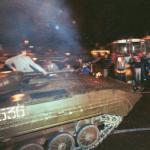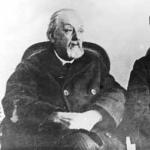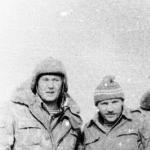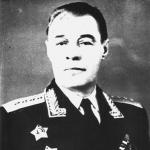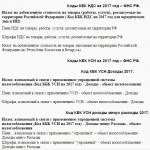General Popov Markian Mikhailovich. Popov Markian Mikhailovich
POPOV Markian Mikhailovich, Soviet military leader, army general (in 1943-1944 and since 1953). Hero of the Soviet Union (05/07/1965).
He came from a family of employees. He graduated from a real school and the Higher Agricultural College. In the summer of 1918, in the city of Novorzhev, Pskov province, he was a clerk at the local headquarters of the Red Guard. In the fall of the same year, during the reorganization of the Red Guard into regular units of the Red Army, he resigned, after which he worked as the head of the volost library. In May 1920, he voluntarily joined the Red Army and was enlisted as a Red Army soldier in the 242nd Volga Rifle Regiment of the 27th Rifle Division. He participated in the Soviet-Polish War of 1920 and was wounded in battle. Upon recovery in January 1921, he was appointed political instructor of the 6th company section of the Pskov Territorial Regiment in Novorzhev. After graduating from the 74th infantry command course in Pskov in January 1922, he was left with them: the squad and platoon commander. From October 1922, he served in the 11th Infantry Division: assistant platoon commander, assistant head of the regimental school, head and political instructor of the regimental school, battalion commander. From October 1924 to October 1925, a student of the intermediate course of the Rifle-tactical advanced training course for the command staff of the Red Army "Vystrel" named after. Comintern. Since November 1929, he was a teacher of tactics at the Leningrad Infantry School and a student of teacher courses at the Rifle and Tactical Improvement Courses for the command staff of the Red Army "Vystrel" named after. Comintern. In January 1930 M.M. Popov was appointed chief of staff of the motorized detachment of the 11th Infantry Division. Since January 1932 - inspector for motorization of the corps of higher educational institutions of the Moscow Military District (MVO). After graduating in 1936 from the Military Academy of the Red Army named after. M.V. Frunze was appointed chief of staff of the 9th mechanized brigade of the Leningrad Military District (LVO). Since July 1937 - Chief of Staff of the 5th Mechanized Corps of the Moscow Military District. Since June 1938 M.M. Popov is the deputy commander of the Far Eastern Front, formed on the basis of the Separate Red Banner Far Eastern Army. Participant in battles on the lake. Hassan. Upon the disbandment of the front in September of the same year, he was appointed chief of staff, and in July 1939 - commander of the 1st Separate Red Banner Army in the Far East. In August 1939 he was awarded the rank of corps commander, and in June 1940 - lieutenant general. In January 1941, Popov was appointed commander of the Leningrad Military District.
With the beginning of the Great Patriotic War M.M. Popov commanded the troops of the Northern Front, which stopped the advance of the Nazi Army “Norway”, the Finnish South-Eastern and Karelian armies in the Murmansk, Kandalaksha, Ukhta and Petrozavodsk-Svirsk directions. Since August 1941 - commander of the troops of the Leningrad Front, defending the approaches to Leningrad from the south and north-west. In November of the same year, he was appointed commander of the 61st Army, which took part in the Battle of Moscow. Since July 1942 - commander of the 40th Army, which took part in the Voronezh-Voroshilovgrad defensive operation. Since October of the same year - deputy commander of the troops of the Stalingrad, then the South-Western fronts. In December he was appointed commander of the 5th Shock Army. As part of the Stalingrad Front, the army took part in the counteroffensive near Stalingrad. At the end of December 1942, Lieutenant General M.M. Popov was appointed commander of the 5th Tank Army. In April 1943, he was awarded the rank of colonel general and appointed commander of the Reserve Front troops. Since June of the same year, he was the commander of the troops of the Bryansk Front, which successfully operated in the Oryol offensive operation during the defeat of the 2nd Tank and 9th Field Armies of Army Group Center defending the Oryol bridgehead. During the Bryansk offensive operation, front troops reached the river. Sozh, crossed it, creating conditions for a further offensive in the Gomel direction. In August 1943 M.M. Popov was awarded the military rank of army general. From October 1943, he headed the Baltic Front, whose troops took part in the Leningrad-Novgorod offensive operation. In April 1944, due to the unsuccessful actions of the front troops in the Baltic States, by Decree of the State Defense Committee, he was reduced in military rank to colonel general, after which he held the position of chief of staff of the Leningrad (April 1944 - March 1945), 2nd Baltic (March 1945), then again on the Leningrad front. In these positions, he took part in the development of plans for the Vyborg, Tallinn offensive, Moonsund landing operations, and in the defeat of the enemy Kurland group.

After the war, Colonel General M.M. Popov, from July 1945, commanded the troops of the Lvov, and from May 1946, the Tauride military districts. By a resolution of the Council of Ministers of the USSR of August 3, 1953, he was restored to the military rank of army general. Since January 1955, deputy chief, and since June 1956, head of the Main Directorate of Combat Training of the Ground Forces. Since August 1956 - Chief of the General Staff - 1st Deputy Commander-in-Chief of the Ground Forces. Since July 1962 - military inspector-adviser of the Group of Inspectors General of the USSR Ministry of Defense. Deputy of the Supreme Soviet of the USSR of the 2nd-6th convocations. He was buried at the Novodevichy cemetery in Moscow.
Awarded: 5 Orders of Lenin, 3 Orders of the Red Banner, 2 Orders of Suvorov 1st class, 2 Orders of Kutuzov 1st class, Order of the Red Star, medals, foreign orders.
Born on November 15, 1902 in the village of Ust-Medveditskaya, now the city of Serafimovich, Volgograd Region, in the family of an employee. Russian. Member of the CPSU (b) CPSU since 1921. Graduated from elementary school.
In the Red Army since 1920. A participant in the Civil War, he fought on the Western Front as a private. In 1922 he graduated from the infantry command courses, in 1925 - the Shot course, in 1936 - the Military Academy named after M.V. Frunze.
Since 1922 M.M. Popov was a platoon commander, then an assistant company commander, assistant chief and head of a regimental school, battalion commander, inspector of military educational institutions of the Moscow Military District. From May 1936 - chief of staff of the mechanized brigade, then the 5th mechanized corps.
Since June 1938 Popov M.M. - deputy commander, since September chief of staff, since July 1939 commander of the 1st Separate Red Banner Army in the Far East, and since January 1941 - commander of the Leningrad Military District.
During the Great Patriotic War, General Popov M.M. commanded the Northern and Leningrad fronts (June - September 1941), the 61st and 40th armies (November 1941 - October 1942). He was deputy commander of the Stalingrad and Southwestern fronts, successfully commanded the 5th Shock Army (October 1942 - April 1943), the Reserve Front and the troops of the Steppe Military District (April - May 1943), Bryansk (June - October 1943) , Baltic and 2nd Baltic (October 1943 - April 1944) fronts. April 20, 1944 Army General M.M. Popov demoted in military rank to colonel general.
From April 23, 1944 until the end of the war, Colonel General Popov M.M. chief of staff of the Loningrad, 2nd Baltic, then again Leningrad fronts.
General Popov M.M. participated in planning operations and successfully led troops in the battles of Leningrad and Moscow, in the Battles of Stalingrad and Kursk, and during the liberation of Karelia and the Baltic states. The troops under his command distinguished themselves during the liberation of the cities of Orel, Bryansk, Bezhitsa, Unecha, Dno, as well as during the crossing of the Desna River.
Rich combat experience in command and staff work gained during the war, M.M. Popov skillfully used it in training troops in the post-war period, holding the positions of commander of the troops of the Lvov (1945-46) and Tauride (1946-54) military districts. In 1953, Colonel General Popov M.M. awarded the highest military rank of "Army General".
Best of the day
Since January 1955 M.M. Popov - Deputy Chief, then Head of the Main Directorate of Combat Training, and from August 1956, Chief of the General Staff - First Deputy Commander-in-Chief of the Ground Forces. Since 1962 - military inspector-adviser of the Group of Inspectors General of the USSR Ministry of Defense. He was elected as a deputy of the Supreme Soviet of the USSR of the 2nd - 6th convocations.
For skillful command of troops during the Great Patriotic War and personal courage shown in the fight against the Nazi invaders, by Decree of the Presidium of the Supreme Soviet of the USSR dated May 7, 1965, Army General Markian Mikhailovich Popov was awarded the title of Hero of the Soviet Union with the Order of Lenin and the Gold medal. Star" (No. 10687).
Honored Soviet military leader, Army General M. M. Popov. died on April 22, 1969. He was buried in the hero city of Moscow at the Novodevichy cemetery.
Awarded 5 Orders of Lenin, 3 Orders of the Red Banner, 2 Orders of Suvorov 1st degree, 2 Orders of Kutuzov 1st degree, Order of the Red Star, medals, as well as foreign orders.
Memorial plaque in memory of the glorious fellow countryman - Hero of the Soviet Union M. M. Popov. installed in the city of Serafimovich, Volgograd region.
fact
cassiopeya 28.11.2009 05:08:07
In April 1944, Markian Mikhailovich was demoted in rank, the reason being that the “little white one” had let him down... But this in no way diminishes his merits in the victory over the Nazis, I still respect him very much, praise and honor him.
Popov Markian Mikhailovich. Army General. Unfortunately, he is an undeservedly little-known figure among Soviet commanders, although all encyclopedias emphasize that Markian Popov is one of the most prominent... More about this military leader Andrey Svetenko talks in the special project “Commanders” on.
He is a non-standard figure in every way. Even before the start of the great war, he was in the leading roles - commander of the OKDA, the Separate Far Eastern Army, then - the troops of the Leningrad Front; in the Soviet-Finnish war, at the beginning of the war - commander of the Northern Front. Markian Mikhailovich is perhaps the only military leader who, having been demoted then, managed to return to the level of front commander.
General Popov has the honor and merit of conducting the most successful military operations in terms of the ratio of losses to the success achieved - Oryol and Bryansk, as commander of the Bryansk Front in the middle of 1943. A breakthrough 200 kilometers deep, with access to the territory of Belarus; in 2 months of fighting - losses of only 13 thousand people. This is when the average daily loss rate of the Red Army throughout the war ranged from 3 to 6 thousand people per day.
In the memoirs of Soviet military leaders, in particular Vasilevsky, Markian Popov certainly deserved to become Marshal of the Soviet Union. One of the most talented commanders, Air Marshal Golovanov, in his memoirs, also emphasized Popov’s talent and erudition: “A genius, he had brilliant abilities in military affairs. In the Battle of Kursk, his troops played one of the main roles.”
Let us add that before this, in the Battle of the Volga, Markian Popov was deputy commander of the Stalingrad Front during the most intense time of defensive battles, and then led the Kotelnikov operation to defeat Manstein’s tank group.
So, according to the general opinion of his colleagues, he is the most educated, erudite (he played the piano!), and extremely easy-going with people. But, to quote Air Marshal Golovanov, “Popov’s weakness for “life-giving moisture” and the fair sex, as they say, stood in his way all his life. As a result, at the end of the war he was demoted both in position and rank to colonel general.” To which we can add only one thing: the slander of ill-wishers played a role.
The unconventional commander was stopped on his way to the marshal's star, as we guess, not because of such an uncontrollable addiction to alcohol, but because, in principle, he was a black sheep. An argument in favor of this is the fact that in February 1945, Markian Popov was again appointed commander of the 2nd Baltic front. But the rank was not returned.
It is significant that this - the second awarding of the rank of army general to Popov - occurred in August 1953, less than six months after Stalin's death. In the 50s, Popov served as chief of the General Staff of the Ground Forces. This also says a lot. In 1965, on the occasion of the 20th anniversary of the Victory, Markian Mikhailovich was awarded the title of Hero of the Soviet Union. The general, who never became a marshal, died 4 years later, in April 1969.
Born in the village of Ust-Medveditskaya Region of the Don Army, now the city of Serafimovich, Volgograd Region of the Russian Federation. From the family of an employee.
Civil War and Interwar Period
20s
- 6/5-1920 (8 months) Red Army soldier of the 242nd Volga Regiment of the 27th Infantry Division.
- 18/2?1921 (6 months) political instructor of the 6th company section of the Pskov Territorial Regiment
- 16/6-21 (7 months) cadet of the 74th Pskov Infantry Course
- 29/1-22 (7 months) Separate commander of the 74th Pskov Infantry Course
- 21/10-22 (2 months) Platoon commander of the 74th Pskov Infantry Course
- 10/15-22 (1 month) deputy platoon commander Consolidated company of the 33rd rifle regiment of the 11th rifle division.
- 22/11-22 (1 year 2 months) platoon commander Training company of the XI division school of the 11th rifle division
- 2/1-1924 (6 months) Pomkomroty Training company of the XI Division School of the 11th Infantry Division
Chief Marshal of the Armored Forces P. A. Rotmistrov:
- 5/10-24 (2 months) Assistant chief of the regimental school of the 33rd Infantry Regiment of the 11th Infantry Division
- 7/10 ?1924 (1 year) “Shot” listener
- 3/10-1925 (5 months) assistant chief of the regimental school of the 33rd Infantry Regiment of the 11th Infantry Division
- 25/2-1926 Head of the regimental school of the 33rd Infantry Regiment of the 11th Infantry Division
- 1/10-1927 commander of the 2nd battalion of the 31st Uritsky Infantry Regiment of the 11th Infantry Division.
- since October, battalion commander of the 33rd Infantry Regiment of the 11th Infantry Division.
- 1/10-1928 teacher Retraining school for reserve commanders of the Red Army, 33rd Infantry Regiment of the 11th Infantry Division
- 1/10-1929 Leningrad Infantry School Tactics teacher
- 1/1-1930 acting Chief of Staff Motorized detachment of the 11th Infantry Division
- 11.3-1930 Chief of Staff of the Motorized Detachment of the 11th Infantry Division
- 11/17-1931 acting inspector of motorization of the corps of military educational institutions of the Moscow Military District (until April 1932)
30s
- In 1936 he graduated from the Military Academy named after M.V. Frunze.
- Since May 1936 - chief of staff of the 9th separate mechanized brigade.
- Since July 1937 - Chief of Staff of the 5th Mechanized Corps.
- From January 1938 - for special assignments under the head of the Directorate for Command and Control of the Red Army.
- Since June 1938 - Deputy Commander of the 1st Red Banner Army in the Far East.
- Since September 1938 - Chief of Staff of the 1st Separate Red Banner Army.
- From July 1939 to January 1941 - commander of the 1st Separate Red Banner Army.
- On August 13, 1939, he was awarded the military rank of corps commander.
- On June 4, 1940, he was awarded the military rank of lieutenant general.
- Since January 1941 - Commander of the Leningrad Military District
The Great Patriotic War
In North-west
- (June 24 - August 26, 1941) Commander of the Northern Front troops
- (August 26 - September 5, 1941) Commander of the Leningrad Front.
Nikita Lomagin Unknown blockade. St. Petersburg 2002. Book 1. p. 63.
In the South-West
- (December 18, 1941 - June 28, 1942) with a short break (January 30 - February 11, 1942) commanded the troops of the 61st Army on the Southwestern and Bryansk fronts,
- (June 28 - July 3, 1942) Lieutenant General M. M. Popov led the 48th Army of the Bryansk Front.
- from July 3, 1942, he commanded the troops of the 40th Army of the Bryansk Front. On this day, the 40th Army was transferred to his command, which was in a difficult situation after a breakthrough at its junction with the 13th Army of German troops during the Voronezh-Voroshilovgrad operation. Under their onslaught, the 40th Army retreated more than 150 km. Subsequently, the front in the army zone became relatively stabilized.
- From October 13, 1942 - deputy commander of the troops of the Stalingrad Front. In this position, he, together with commander A.I. Eremenko, participated in organizing the actions of the defending troops in Stalingrad, preparing the counteroffensive and its implementation, which began on November 20, 1942.
- After the successful encirclement of the enemy group at Stalingrad, M. M. Popov actively participated in organizing command and control of troops to expand the zone between the internal and external fronts of the encirclement.
- On December 8, 1942, he headed the 5th Shock Army, leaving the post of deputy front commander. With this army, which arrived from the RGK, M. M. Popov participated in the Kotelnikovsky operation.
- On December 26, 1942, he was appointed to the post of deputy commander of the Southwestern Front,
- and on December 28, he was entrusted with the command of the 5th Tank Army of the Southwestern Front, leaving the post of deputy front commander.
- However, already in January 1943, he left these posts and went into the General Headquarters reserve.
- Headed the operational group of the Southwestern Front in Operation Leap. Mobile group of Lieutenant General M. M. Popov
- From April 10 to April 15, 1943 - commander of the Reserve Front (3rd formation). On April 15 of the same year, the Reserve Front was renamed the Steppe Military District.
- From June 5 to October 10, 1943 - commander of the Bryansk Front, Oryol Operation, Bryansk Operation.
- Army General since August 26, 1943.
Back in the North-West
The administration of the Bryansk Front was transferred to the Baltic states and renamed the Baltic Front.
- from October 10, 1943 to April 23, 1944 - commander of the troops of the Baltic Front.
- On October 20, 1943, the Baltic Front was renamed the 2nd Baltic Front.
On January 14, 1944, troops of the Leningrad and Volkhov fronts began the Leningrad-Novgorod offensive operation. The 2nd Baltic Front, at the beginning of the operation, performed a diversionary function, preventing the enemy from transferring troops to the direction of the main attack, actively operating with formations only of the 1st Shock Army. Later, when the neighbors began to develop their success, the troops entrusted to M. M. Popov actively participated in the offensive. However, they failed to detect the withdrawal of the 16th German Army in time and prevent it. By March 1, the front troops, by order of Headquarters, went on the defensive.
The formations of the 2nd Baltic Front were preparing for new battles.
- On April 20, 1944, front commander M. M. Popov was demoted in rank from army general to colonel general for alcohol abuse and actions discrediting the honor of the commander of the Red Army.
- On April 23 of the same year, he was transferred to the post of chief of staff of the Leningrad and 2nd Baltic fronts.
Lieutenant General B.V. Bychevsky, a worker at the headquarters of the Leningrad Front, recalled:
While in this post, he actively participated in organizing the actions of the front troops in all operations they carried out. These were the Vyborg-Petrozavodsk operation, in which the Leningrad Front participated with its right wing, the Rezhitsa-Dvina operation of the 2nd Baltic Front, the Narva operation of the Leningrad Front, the Madona operation of the 2nd Baltic Front, the Baltic operation, in which both fronts participated.
- From February 4 to February 9, 1945, M. M. Popov again commanded the 2nd Baltic Front,
- and then again led the headquarters of the Leningrad Front.
The most outstanding is the Bryansk offensive operation in August - September 1943, carried out by troops of the Bryansk Front under his command. In this operation, Popov introduced troops into a breakthrough in a sector of the neighboring Western Front, and then cut through the enemy’s defenses with a strike from a maneuver group. Front losses in this operation are among the smallest in similar operations of the Soviet troops (irrecoverable - 13,033 people, sanitary - 43,624 people) with significant results (advance up to 200 kilometers, breakthrough into Belarus, liberation of Bryansk, Bezhitsa, crossing of the Sozh and Desna rivers ).
After the war
After the war, he commanded the troops of the Lvov (1945-46) and Tauride (1946-54) military districts. Golovanov: In 1951, large staff exercises were held in Ukraine with the participation of a number of districts, where M. M. Popov, leading the “blues,” did not give the “reds” the opportunity, despite their significant superiority, to win victories, again showing off his military leadership talent.
In 1953, M. M. Popov was awarded the military rank of Army General for the second time (08/3/1953).
From January 1955 - Deputy Chief and then Head of the Main Directorate of Combat Training of the Ground Forces, from August 1956 Chief of the Main Staff - 1st Deputy Commander-in-Chief of the Ground Forces. Since July 1962 - military inspector-adviser of the Group of Inspectors General of the USSR Ministry of Defense. Deputy of the Supreme Soviet of the USSR of the 2nd-6th convocations.
Buried at Novodevichy Cemetery in Moscow
POPOV Markian Mikhailovich(11/15/1902, Ust-Medveditskaya village, now Volgograd region - 4/22/1969, Moscow). Russian. Army General(1953). Hero of the Soviet Union (7.5.1965).
In the Red Army since 1920. Graduated from infantry command courses (1922), rifle and tactical advanced training courses for the command staff of the Red Army "Vystrel" named after. Comintern (1925), Military Academy. M. V. Frunze (1936).
During the Civil War, M. M. Popov fought on the Western Front, a Red Army soldier.
In the interwar period from 1922, M. M. Popov was a platoon commander, assistant company commander, assistant chief and head of the regimental school, battalion commander, inspector of universities in the Moscow Military District. From May 1936, chief of staff of the mechanized brigade, then the 5th mechanized corps. Since June 1938, M. M. Popov has been deputy commander, since September - chief of staff, since July 1939, commander of the 1st Separate Red Banner Army in the Far East, since January 1941, commander of the troops of the Leningrad Military District.
Since the beginning of the Great Patriotic War, M. M. Popov commanded the troops of the Northern Front, which stopped the advance of enemy troops in the Murmansk, Kandalaksha, Ukhta and Petrozavodsk-Svirsk directions. Since August 1941, commander of the troops of the Leningrad Front, defending the approaches to Leningrad from the south and north-west. Since November of the same year, M. M. Popov was the commander of the 61st Army, which took part in the Battle of Moscow. Since July 1942, commander of the 40th Army, which took part in the Voronezh-Voroshilovgrad defensive operation. Since October, deputy commander of the troops of the Stalingrad, then the Southwestern Fronts. Since December - commander of the 5th Shock Army of the Stalingrad (from December 26 - Southwestern) Front. M. M. Popov distinguished himself while commanding a group of troops of the Southwestern Front during the Voroshilovgrad offensive operation, during the liberation of the city of Krasnoarmsysk. From April 1943, M. M. Popov commanded the troops of the Reserve Front, then the Steppe Military District, and from June he was the commander of the troops of the Bryansk Front, which successfully operated in the Oryol offensive operation during the defeat of the 2nd Tank and 9th Field Armies of Army Group Center, defending the Oryol bridgehead. During the Bryansk offensive operation, front troops reached the river. Sozh, crossed it, creating conditions for a further offensive in the Gomel direction. Since October 1943, M. M. Popov was the commander of the troops of the Baltic (later 2nd Baltic) Front, which took part in the Leningrad-Novgorod offensive operation. During the operations carried out by the front troops under the command of M. M. Popov, his military leadership talent, ability to quickly and correctly assess the situation and make bold decisions were clearly demonstrated. From April 1944 until the end of the war, M. M. Popov was the chief of staff of the Leningrad, then the 2nd Baltic, then again the Leningrad fronts. Participated in the development of plans for the Vyborg, Tallinn offensive, Moonsund landing operations, and the defeat of the enemy’s Kurland group.
After the war, M. M. Popov commanded the troops of the Lvov, then Tauride military districts. M. M. Popov skillfully used his rich combat experience in command and staff work in training troops, holding the positions of deputy chief and chief of the Main Directorate of Combat Training, chief of the Main Staff - 1st Deputy Commander-in-Chief of the Ground Forces, military inspector-adviser of the Group of Inspectors General of the USSR Ministry of Defense. For successful leadership of troops, personal courage and bravery, as well as in connection with the 20th anniversary of Victory in the Great Patriotic War, M.M. Popov was awarded the title of Hero of the Soviet Union.
Awarded 5 Orders of Lenin, 3 Orders of the Red Banner, 2 Orders of Suvorov 1st class, 2 Orders of Kutuzov 1st class, Order of the Red Star, medals, as well as foreign orders.
